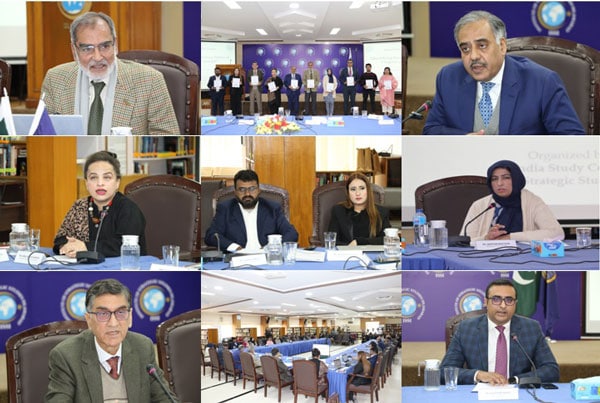Quantifying electoral politics of Congress and BJP’
The India Study Centre (ISC) at the Institute of Strategic Studies Islamabad (ISSI) launched its special study, “Quantifying Electoral Politics of Congress and BJP,” authored by Director ISC Dr. Khurram Abbas, and researchers MaheenShafeeq and UsamaHameed.
This groundbreaking research, the first of its kind in Pakistan on the 18th LokSabha, offers a comprehensive analysis of political trends in India through quantification of the newly-elected MPs from the ruling BharatiyaJanata Party (BJP) and the leading opposition party Indian National Congress (INC) on various indicators like caste, religious affiliation, wealth status, and familial roots in the country’s politics. The study’s launch featured a distinguished panel of experts who shared their perspectives on its findings. Along with the keynote address by Mr. Khalid Rahman, Chairman Institute of Policy Studies (IPS), the other speakers included Ambassador Babar Amin, former diplomat; Dr. AsmaShakirKhwaja, Executive Director of Center for International Strategic Studies, Azad Jammu & Kashmir; and Ms. Maryam Mastoor, Research Fellow, Institute of Regional Studies. Dr. Khurram Abbas introduced the significance of and rationale behind this data-based study, and methodological approach which was employed to collect and analyze the data.
The keynote address by Mr. Khalid Rahman provided a critical perspective on India’s electoral process, questioning whether the claim of being the “largest democracy” reflected true democratic substance or was merely a façade. He highlighted systemic issues such as manipulation of voter rolls, suppression of civil society organizations, and changes to the Chief Election Commissioner appointment process that consolidated executive control. These factors, he argued, raise serious concerns about India’s commitment to much-celebrated democratic principles and electoral integrity. He also underscored the importance of expanding the data-based research work on India-related subjects. In his remarks on the occasion, DG ISSI Ambassador SohailMahmood highlighted that the 2024 elections in India were particularly noteworthy for their scale and political implications. With over 969 million eligible voters, the elections spanned seven phases, making them the longest in Indian history. He observed that while the BJP pursued aggressive campaigning with slogans like “AbkiBaar 400 Paar,” their performance reflected a decline in dominance, securing 240 seats compared to 303 in 2019. This contrasted with notable resurgence for the Congress, which gained official opposition status after a decade.
Ambassador SohailMahmood emphasized that India’s democratic identity was increasingly influenced by socio-political inequalities stemming from the ages-old, oppressive caste system and class stratification. He noted that the blending of India’s democratic ethos with a Hindu nationalist agenda entails serious concerns internationally, with scholars characterizing it as ‘ethnic’ or ‘illiberal’ democracy and even entities like the V-Dem Institute










